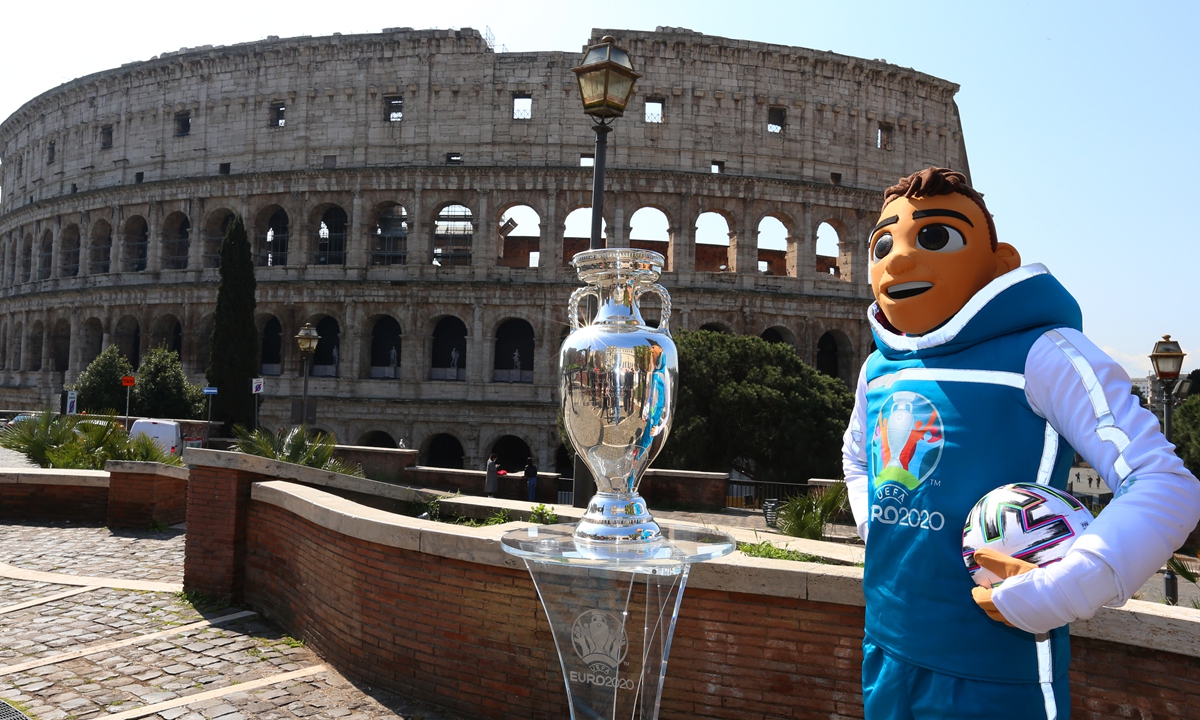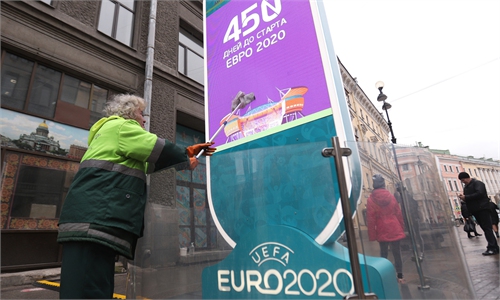Chinese companies grab attention as sponsors at UEFA event
COVID-19, geopolitics won’t stop brands going global through sponsorship

Euro 2020 mascot Skillzy poses with the trophy in front of the Colosseum during the UEFA Euro 2020 Trophy Tour of Rome on April 20 in Rome, Italy. Photo: VCG
The strong presence of Chinese sponsors is drawing attention at the UEFA Euro 2020 after the first top-notch sporting event kicked off on Friday in Rome despite the coronavirus pandemic. Four Chinese companies, among the 12 sponsors of the UEFA European Championships, represent Chinese brands' ambitions to go global.
Hisense, Alipay, Vivo and TikTok are among the UEFA National Team Football Official Sponsors and UEFA Euro 2020 Official Sponsors, making China one of the largest sources of sponsors for this year's football party in Europe. Other sponsors include FedEx, Booking.com, Volkswagen, Coca-Cola and Qatar Airways.
On Sunday night Beijing time, electronics manufacturer Hisense and the British Embassy in Beijing invited more than 400 football fans to watch the soccer game.
"This year and next year are big years for global sporting events because the UEFA Euro, Olympic Games and World Cup are being or will be held one after another. It is an excellent time for our brand to expand its profile," Hisense told the Global Times in a statement on Monday.
It is the second time for Hisense to sponsor the UEFA Euro event. Ipsos found the brand awareness of Hisense doubled in five countries in Europe (Britain, Germany, France, Italy and Spain) after it sponsored the Euro 2016.
ByteDance-owned TikTok became the first digital entertainment platform to sponsor the tournament as the short-video sharing platform "is looking to cement its reputation as the home for football fans to share their passion for the game, as well as driving awareness with new audiences," according to a statement published on UEFA.com in February.
The platform has gained rising popularity in multiple countries and is regarded by industry practitioners as one of the most successful Chinese brands in going global.
"Sports, especially soccer, are popular among European consumers. Sponsoring the Euro is beneficial to build a bridge between the brand and the audiences," Zhang Qing, CEO of Key Solution Sports Co, a firm that consults on the sports industry in China, told the Global Times on Monday.
According to Zhang, in the 1980s, Japanese companies sponsored a good number of international sporting events and South Korean companies started to do so in the 1990s. "Now, Chinese companies are more competitive in fields such as consumer electronics, home appliances, mobile devices, and IT. The latecomers now have an upper hand."
He said this reflected Chinese companies' growing investment in technological research and development, as well as improving participation in the global value chain.
However, the road to globalization is beset with hurdles. "Unreasonable anti-globalization or protectionist actions have had an adverse impact on Chinese companies," Zhang pointed out.
Because of the pandemic, manufacturing activity in India was affected, and raw material bases in northern Vietnam were also disrupted.
Chinese internet giant Alibaba, which signed an $800 million deal to sponsor the Olympic Games through 2028 according to media reports, may also see declining publicity effects and audience numbers at the Tokyo 2020 Olympic Games, industry experts said.
Despite the hardships, Chinese companies agreed that globalization will still be a pivotal strategy, and they will not give up overseas markets.
One of the sponsors for the UEFA Euro 2020, Chinese smartphone manufacturer Vivo, has been expanding in the European market since October 2020. In February, it entered Romania and the Czech Republic, and it plans to cover more than 12 markets in Europe by the end of the year.
Deng Li, Vivo vice president and president of the European markets, said that Vivo hopes to adopt a "local mentality, local culture and local management" philosophy to serve consumers and better integrate into the local market. By respecting its local European partners and the needs of local consumers, Vivo is committed to localized operations and is doing well in the European market.
According to Counterpoint, Vivo's global smartphone market share increased from 5 percent in the first quarter of 2018 to 10 percent in the first quarter this year.
Hisense is also speeding up its global expansion. It started to build an intelligent household appliance industrial park in Mexico in March, where it will make refrigerators, washing machines, ovens and air conditioners for customers in Mexico, US and Canada. In the same month, the brand's first air conditioner was produced in Thailand.


